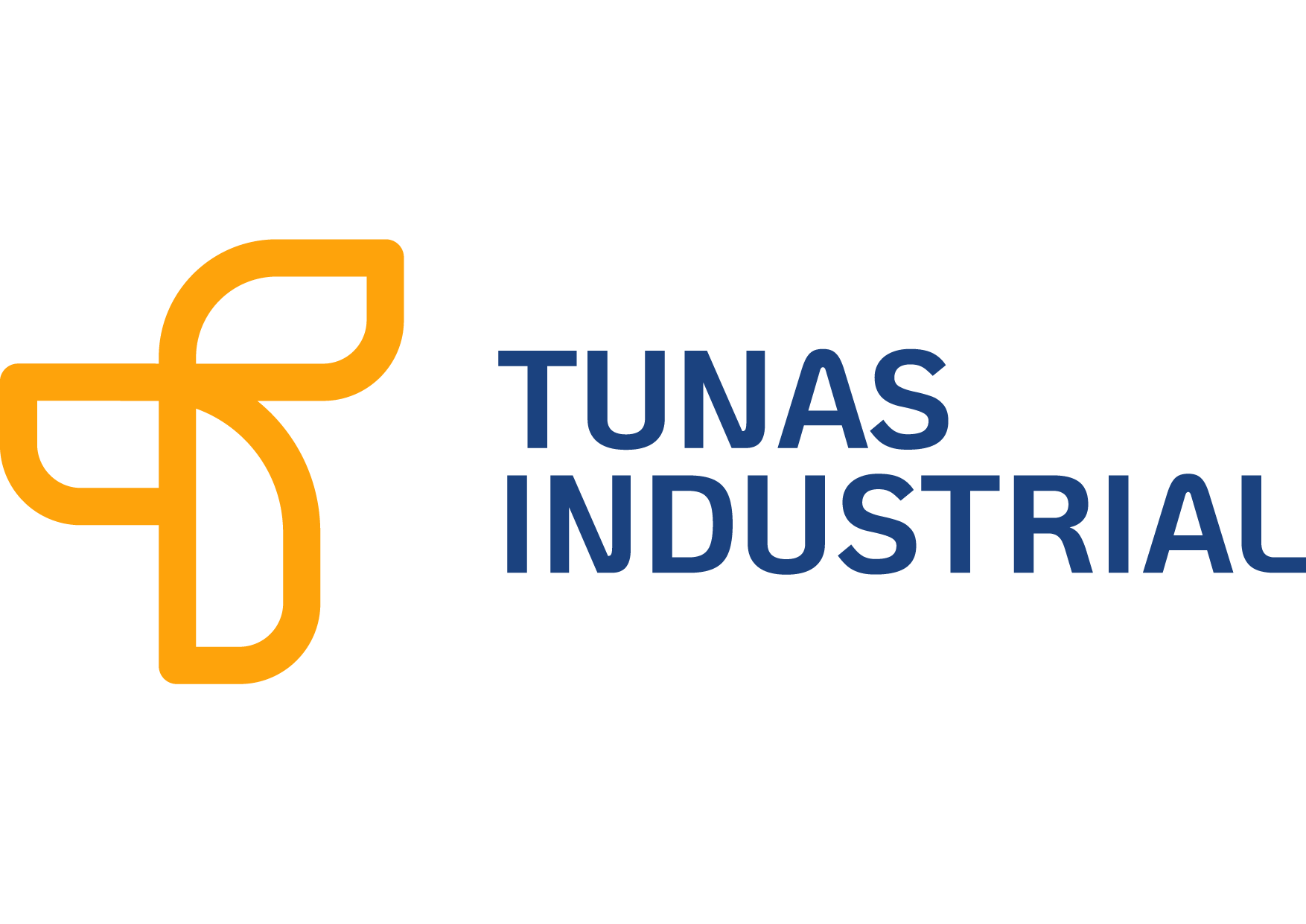
16 Jun
Tunas Industrial Representative Shares Vision at Indonesia Critical Minerals Expo 2025
JAKARTA, June 4, 2025 — As the world accelerates toward green technologies and digital transformation, the demand for critical minerals—including tin—has reached unprecedented levels. Tin, often overshadowed by more publicized materials, is essential for electronics, energy storage, and emerging innovations like electric vehicles and smart infrastructure. Indonesia, the world’s second-largest tin producer, stands at the forefront of this global shift.
Indonesia’s tin industry continues to play a pivotal role in the global critical minerals race, underpinning the world’s shift to green technologies and digital economies. Tin is vital for electronics, batteries, and renewable energy, with global demand projected to grow at a CAGR of 2.5–3.0% through 2030 (ITA, 2023).

On Day 2 of the Indonesia Critical Minerals Conference & Expo (ICM) 2025, Tunas’s Head of Business Development, Chrispin Andereas, had the privilege of joining a panel discussion on the role of Southeast Asia’s tin industry in the Belt and Road Initiative. He highlighted how Batam, as a Free Trade Zone with a mature electronics manufacturing ecosystem and close proximity to Indonesia’s tin-rich Bangka region, is well positioned to support the downstreaming of tin into high-value applications. Tin-based materials are increasingly essential in semiconductors, AI computing hardware, and data centers—and Batam offers a unique platform to bridge tin resource processing with global electronics supply chains.
As critical minerals drive the global green economy, Indonesia’s tin sector stands ready to lead with the right investments in ESG, innovation, and infrastructure. Tunas Industrial is dedicated to fostering integrated mineral processing and value-added industries, strengthening communities, and driving sustainable economic growth through strategic partnerships and responsible practices.
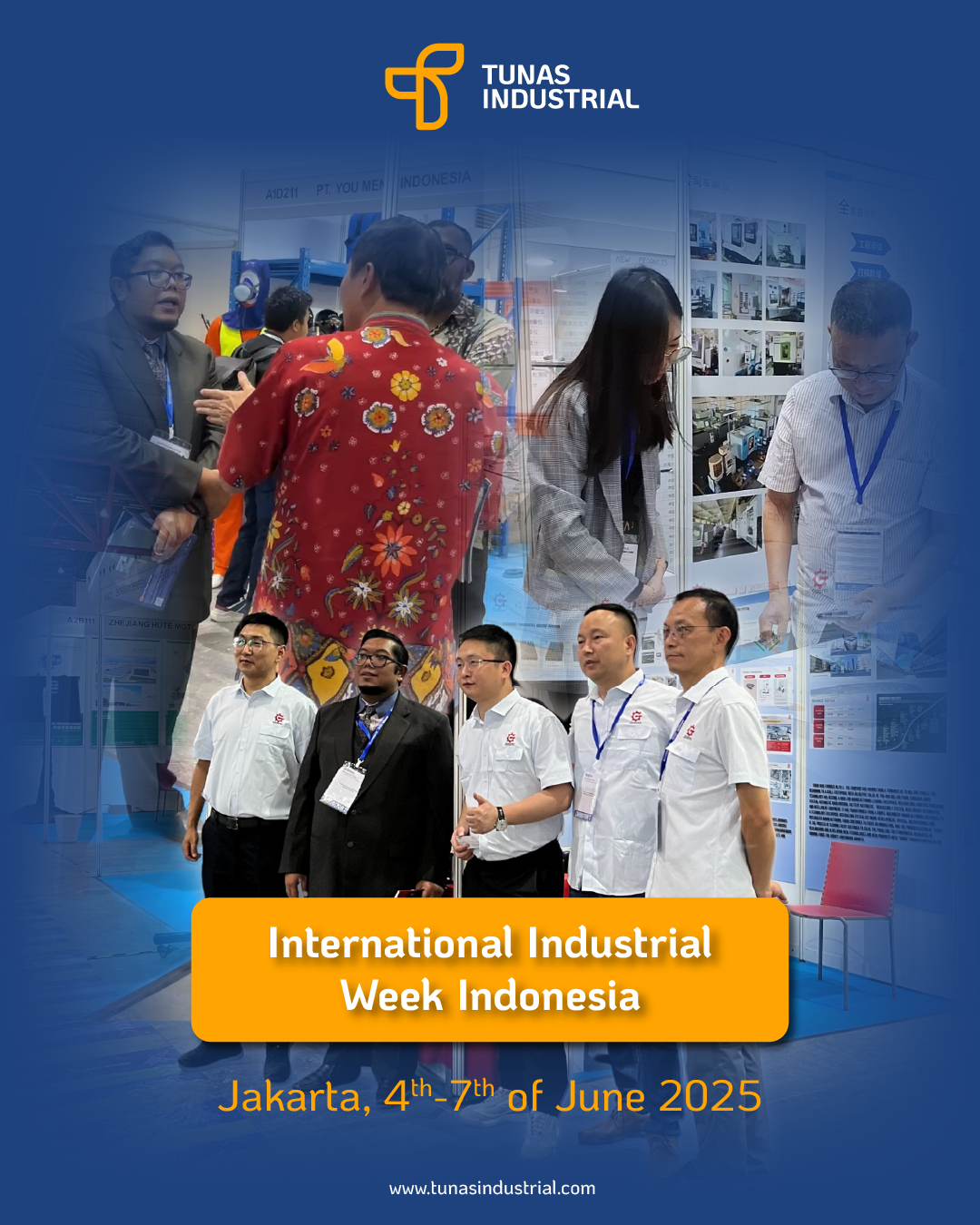
16 Jun
Tunas Industrial Joins International Industrial Week Indonesia 2025
JAKARTA, 8 June 2025 — As global industries recalibrated in the wake of supply chain disruptions, Indonesia’s industrial sector continued its rapid transformation into a hub for value-added production, smart technologies, and global collaboration. Key sectors—such as logistics, packaging, and metalworking—led this evolution, powered by e-commerce growth, automation, and sustainable practices.
This transformation was showcased at International Industrial Week Indonesia (IIW 2025), held at JIExpo Kemayoran, Jakarta, from 4–7 June 2025. Tunas Industrial has proudly participated in this event, highlighting Indonesia’s dynamic role in becoming a regional industrial powerhouse. Along with over 1,800 exhibitors and 45,000 trade buyers from 14 key sectors, including:
- Logistic & Material Handling Equipment
- Machine Tool & Metal Processing
- Compressors
- Food Processing & Packaging Machinery
- Woodworking Machinery
- Packaging & Printing Machinery
- Plastic Machinery & Moulds
- Welding Materials & Equipment
- Power Transmission & Control Technology
- Pumps & Valves
- Labour Protection Appliances
- Automotive Parts
- Fasteners & Power Transmission
- Agricultural Machinery
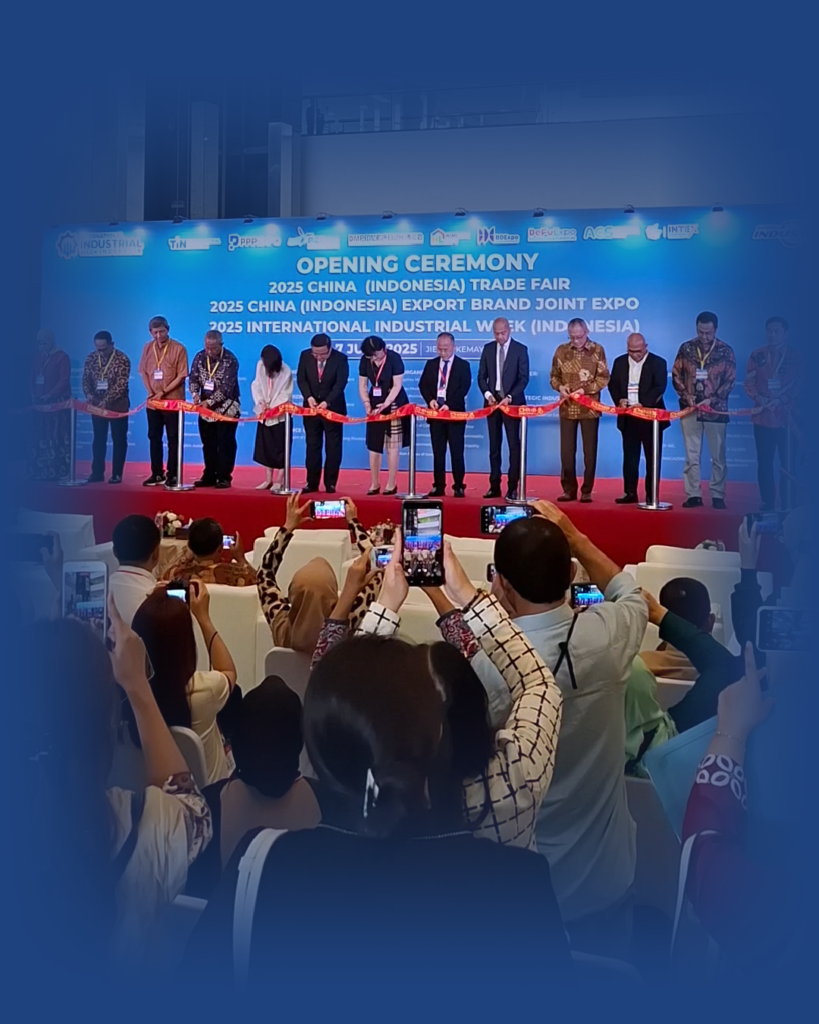
IIW Indonesia 2025 served as the leading platform to showcase the latest technological innovations across the country’s industrial sectors. Companies presented automation, digitalization, and eco-friendly technologies that enhanced efficiency and competitiveness. Key trends such as IoT, AI, and advanced robotics were highlighted, making the exhibition a hub for innovation and collaboration.
The event offered opportunities for businesses to expand markets, adopt new technologies, and build strategic partnerships. Tunas Industrial’s participation underscored its commitment to strengthening synergy with both local and global industry players.
As Batam’s leading industrial estate, Tunas Industrial leveraged the event to highlight Batam’s strategic position as Indonesia’s future-ready industrial hub. Tunas Industrial’s advantages included:
- Free Trade Zone and SEZ status for tax incentives and streamlined processes.
- World-class infrastructure and reliable utilities.
- A skilled, adaptive workforce.
- Technology-driven sectors, from electronics to renewables.
- Proximity to Singapore and direct access to global trade routes.
Tunas Industrial’s presence at IIW 2025 was more than an exhibition—it was a commitment to forging partnerships and accelerating Batam’s industrial growth. We invite industry leaders, manufacturers, and investors to collaborate with us in building a sustainable, technology-driven future. For more information, visit www.tunasindustrial.com
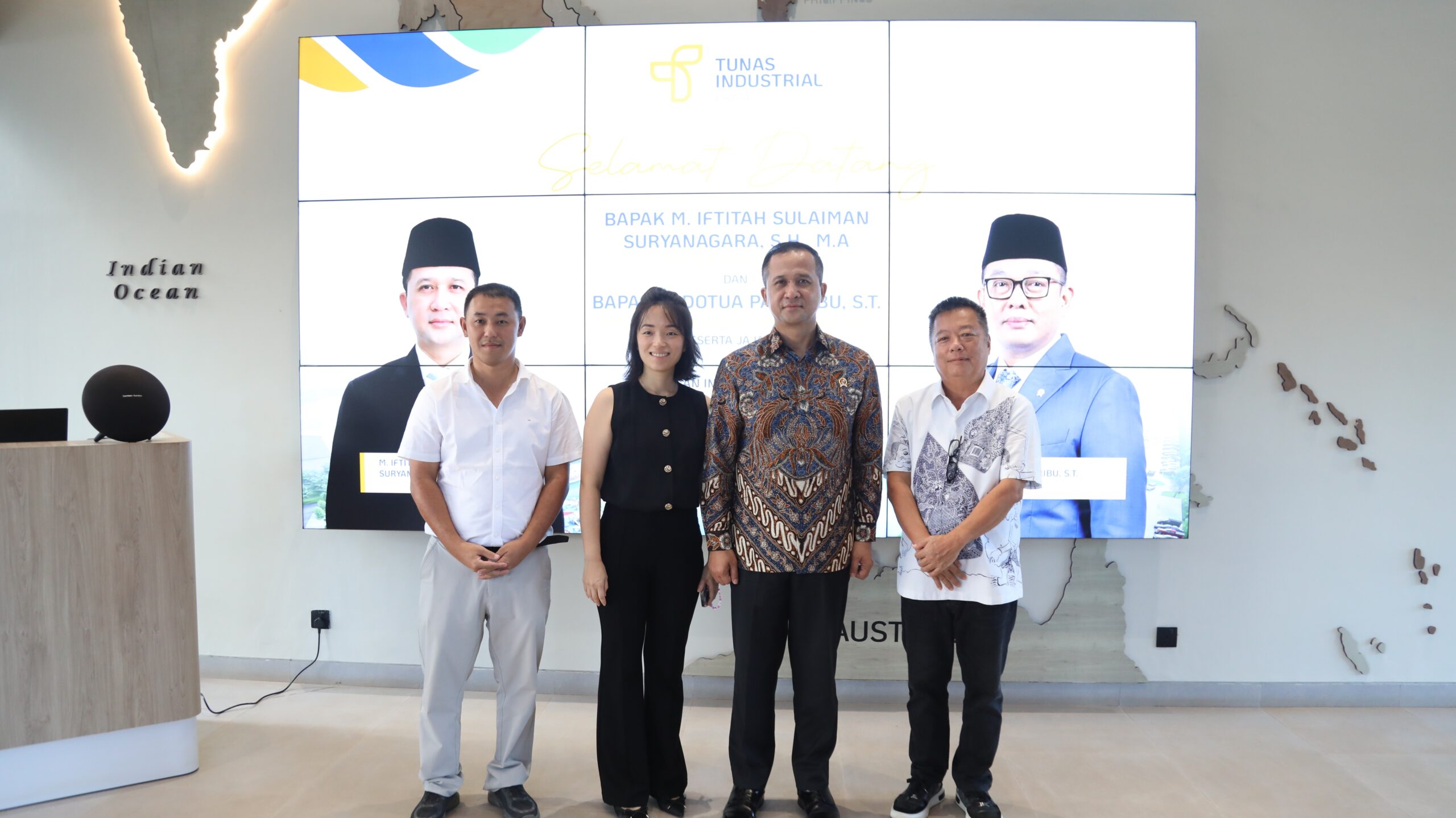
04 Jun
Minister of Transmigration and BP Batam Visit to Tunas Prima Industrial Estate
Batam, June 3, 2025 — Indonesian Minister of Transmigration, Muhammad Iftitah Sulaiman Suryanagara, and Vice Minister of Investment and Downstream/BKPBM, visited the Tunas Prima Industrial Estate in Batam. Accompanied by Batam Vice Mayor Li Claudia Chandra and BP Batam officials, Minister Iftitah and his delegation received presentations on the industrial sector’s prospects from investors as well as the latest project updates from Tunas Industrial management.
The visit also included an introduction to the Green Industry concept of Tunas Prima Industrial Estate, which has earned the Greenmark certification. The delegation toured several warehouse tenant sites, infrastructure, and facilities. Minister Iftitah expressed his appreciation for the strong synergy between Tunas Industrial and the Batam government in fostering regional economic growth, and highlighted Batam’s role as one of Indonesia’s leading investment hubs.
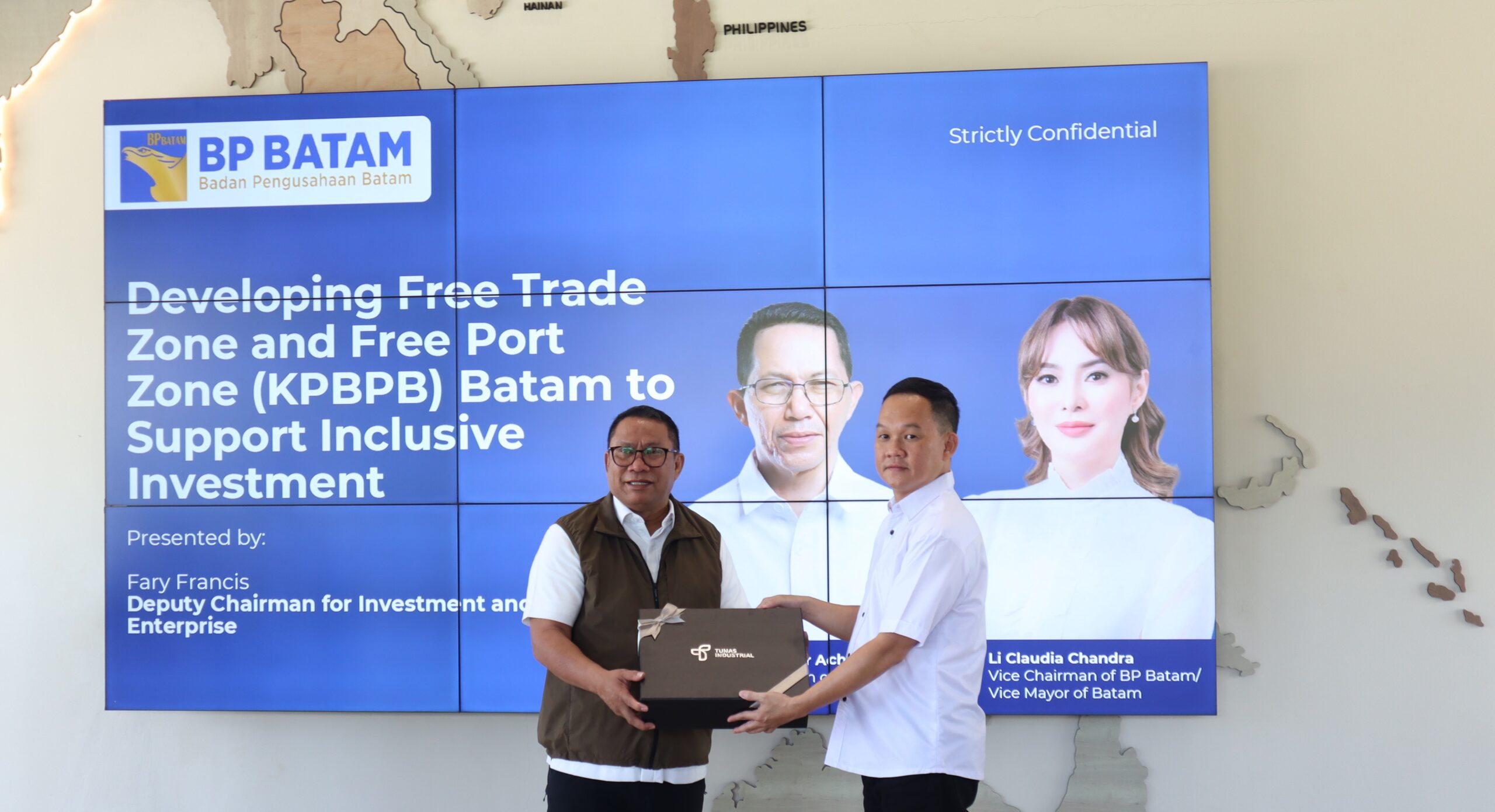
04 Jun
BP Batam Takes Proactive Steps to Boost Investment in Batam with Tunas Prima
Batam, 2 June 2025 — BP Batam, through its Deputy for Investment and Business Development, Fary Djemy Francis, is intensifying synergy and collaboration with Batam’s industrial estates to foster seamless investment processes and inclusive economic growth.
During a working visit to Tunas Prima Industrial Estate, Fary emphasized BP Batam’s new proactive approach in addressing investment-related challenges. “President Prabowo’s directive is clear: BP Batam must be present on the ground, engage directly with businesses, and resolve issues on-site,” he stated.
This hands-on approach has already proven effective in accelerating services for investors. During the visit, BP Batam listened to concerns from several tenants in Tunas Prima—including pending business permits—and successfully resolved the issues on-site in under two hours through swift coordination.
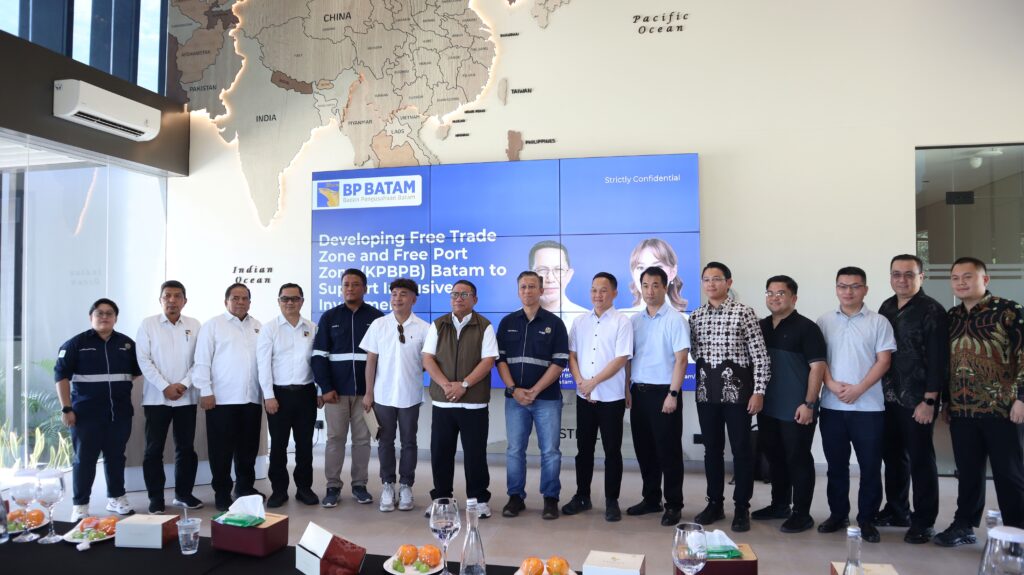
Chrispin Andereas, Head of Business Development at Tunas Industrial, praised BP Batam’s prompt response. “We greatly appreciate BP Batam’s more proactive working style. Several investment challenges we and our tenants faced were resolved quickly, and other concerns have been noted for immediate follow-up,” he said.
BP Batam also shared its strategy to develop priority infrastructure projects across Batam, introducing two key innovations: the Investment Envoy program and the Business Complaint Digital Dashboard. These initiatives are designed to improve transparency and ensure efficient, measurable, and responsive resolution of investment challenges. This aligns with President Prabowo’s directive to achieve economic growth in Batam at least 2% above the national average annually.
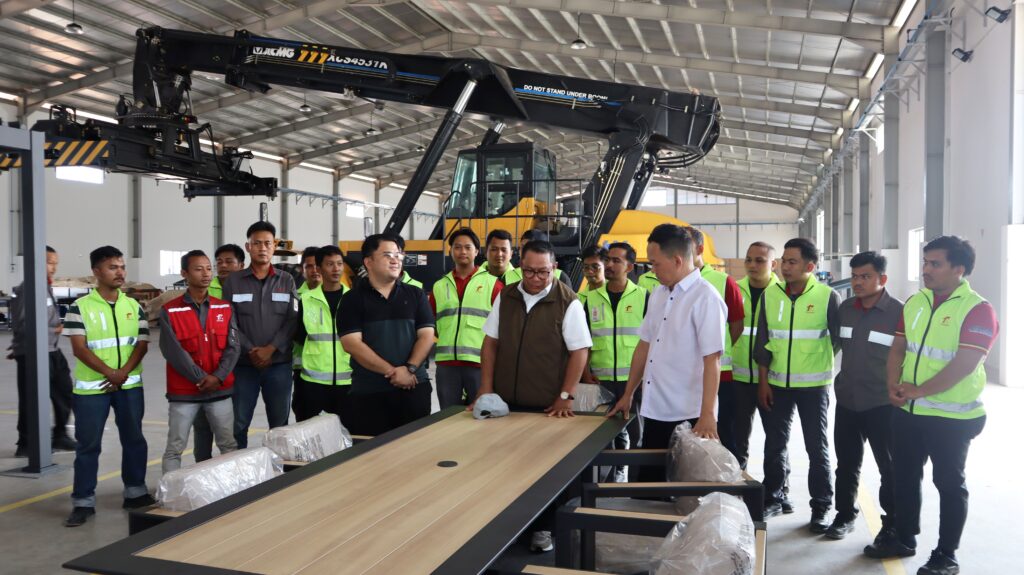
Collaboration between BP Batam and industrial estate operators is essential to foster a healthy investment climate, support Batam’s economic growth, and ensure ease of doing business for both local and international investors.
With robust infrastructure and business services, Tunas Industrial remains a leading hub for investment growth in Batam. Its three ongoing industrial park projects—Tunas Batam Center (64 hectares), Tunas Kabil (30 hectares), and Tunas Prima (100 hectares)—are being developed with a focus on green sustainability since 2023.
As a strategic partner of the Batam government, Tunas Industrial is committed to supporting the investment climate by developing modern, integrated, environmentally friendly, and sustainable industrial estates.
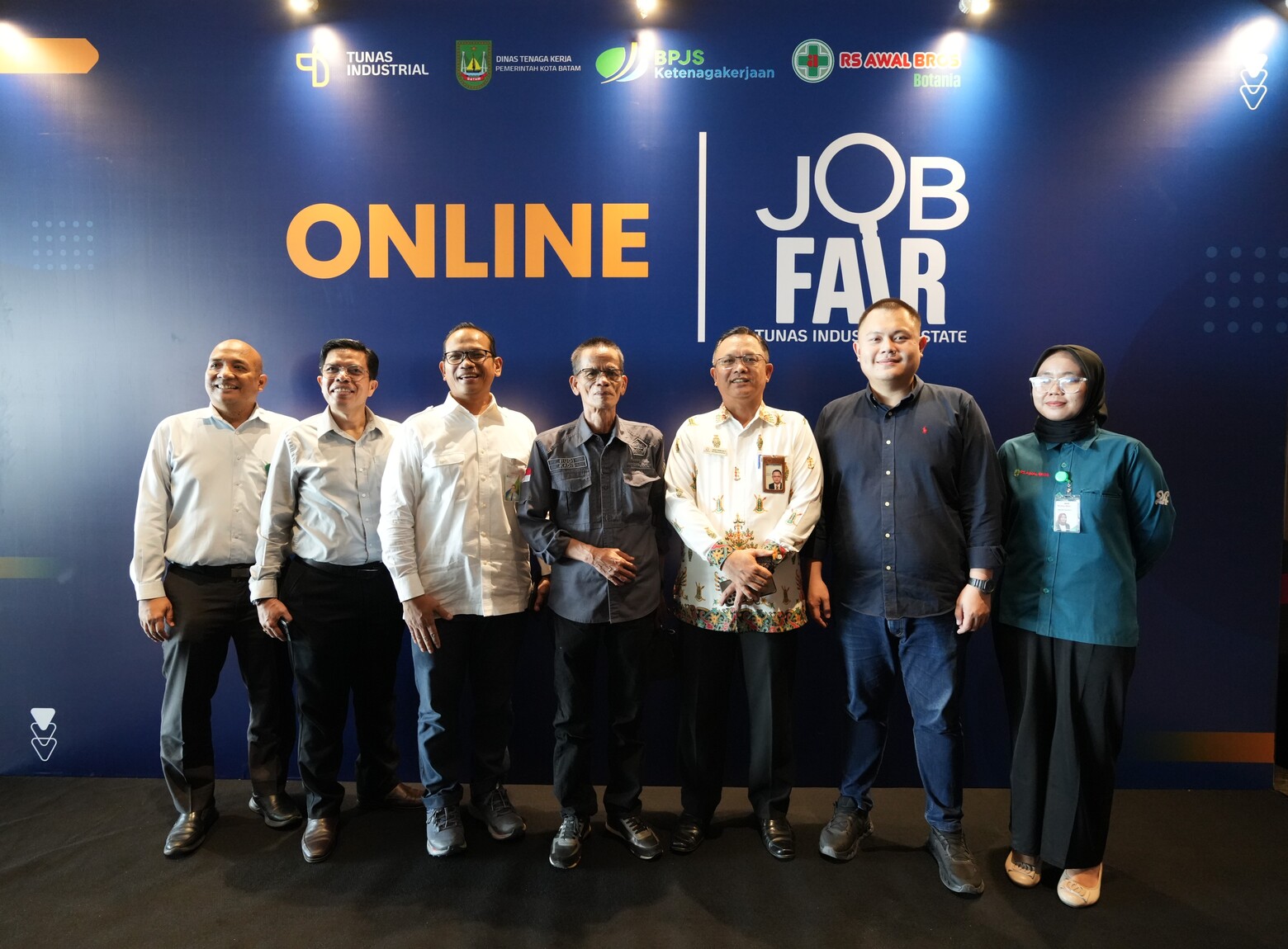
27 May
Tunas Industrial 2025 Job Fair – Press Release
Tunas Industrial Job Fair 2025 Boosts Local Employment and Job Access in Batam
Batam, May 27, 2025 — Tunas Industrial Estate successfully held the Tunas Industrial Job Fair 2025 online on Tuesday, May 27, 2025. The event was organized in strategic collaboration with the Batam City Manpower Office (Disnaker Kota Batam) as a concrete commitment to expanding employment opportunities and empowering local talent in Batam.
A total of 22 companies participated in the job fair, offering a wide range of career opportunities across strategic sectors including manufacturing, information technology, logistics, engineering, and finance. Public enthusiasm was overwhelming, with 56,017 applications submitted via the online registration system open from May 12–22, 2025.
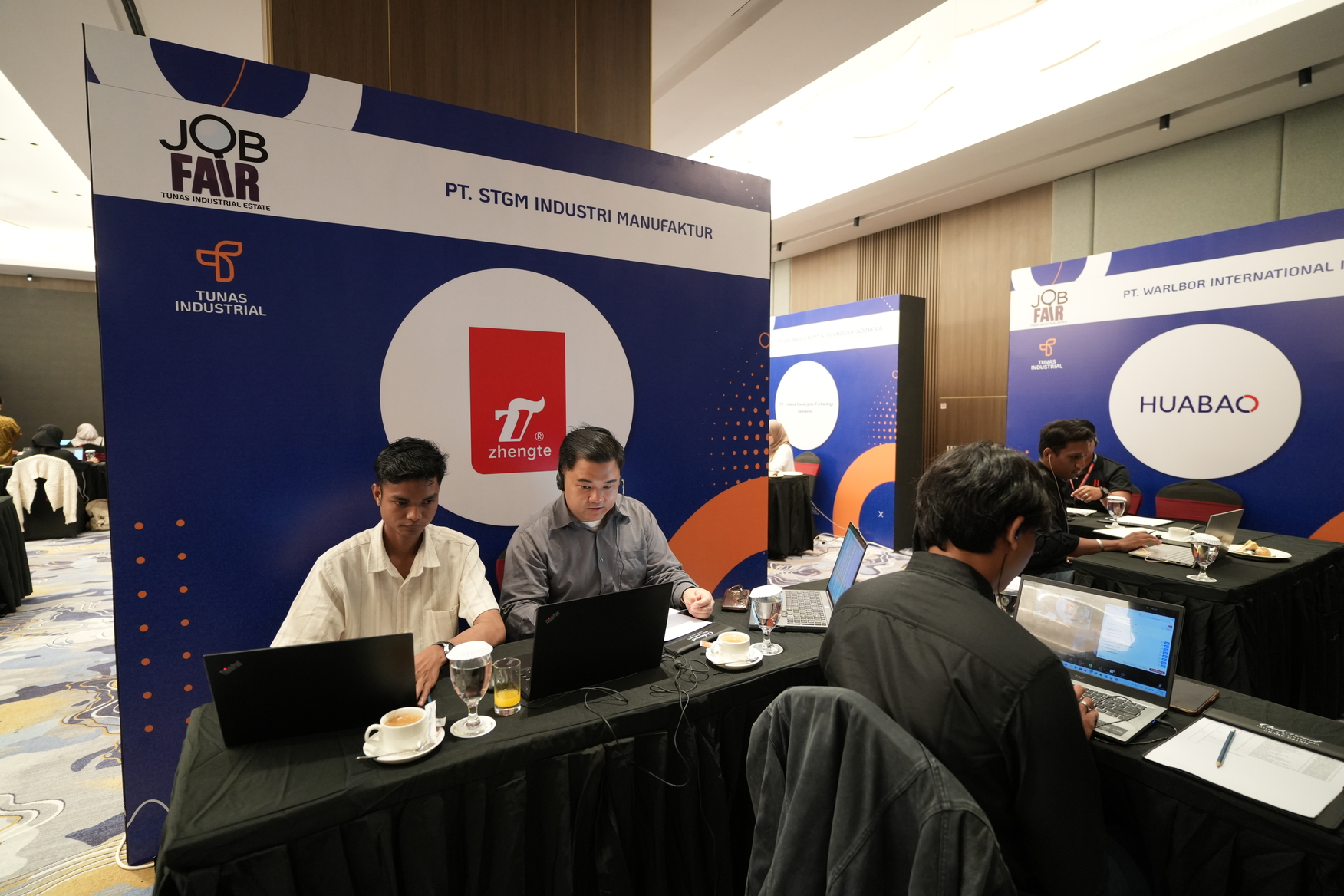
Following the administrative screening process, 12,331 applicants qualified for the next stage, and 1,456 candidates advanced to online interviews. These interviews were conducted with company representatives gathered at Oakwood Hotel & Apartments Grand Batam, while candidates participated remotely from their respective locations.
The online system was adopted to efficiently manage the surge in applicants, which exceeded expectations. Rudi Sakyakirti, SH, MH, Head of the Batam Manpower Office, stated that the online format proved to be significantly more effective than traditional in-person methods.
“With this system, applicants are pre-screened, so only those who meet company criteria proceed to the interviews. The process is much smoother and more efficient,” he explained.
Calvin Winata, General Manager of Tunas Industrial, emphasized that the job fair reflects Tunas Industrial’s ongoing commitment to driving regional economic growth by creating inclusive and high-quality job opportunities.
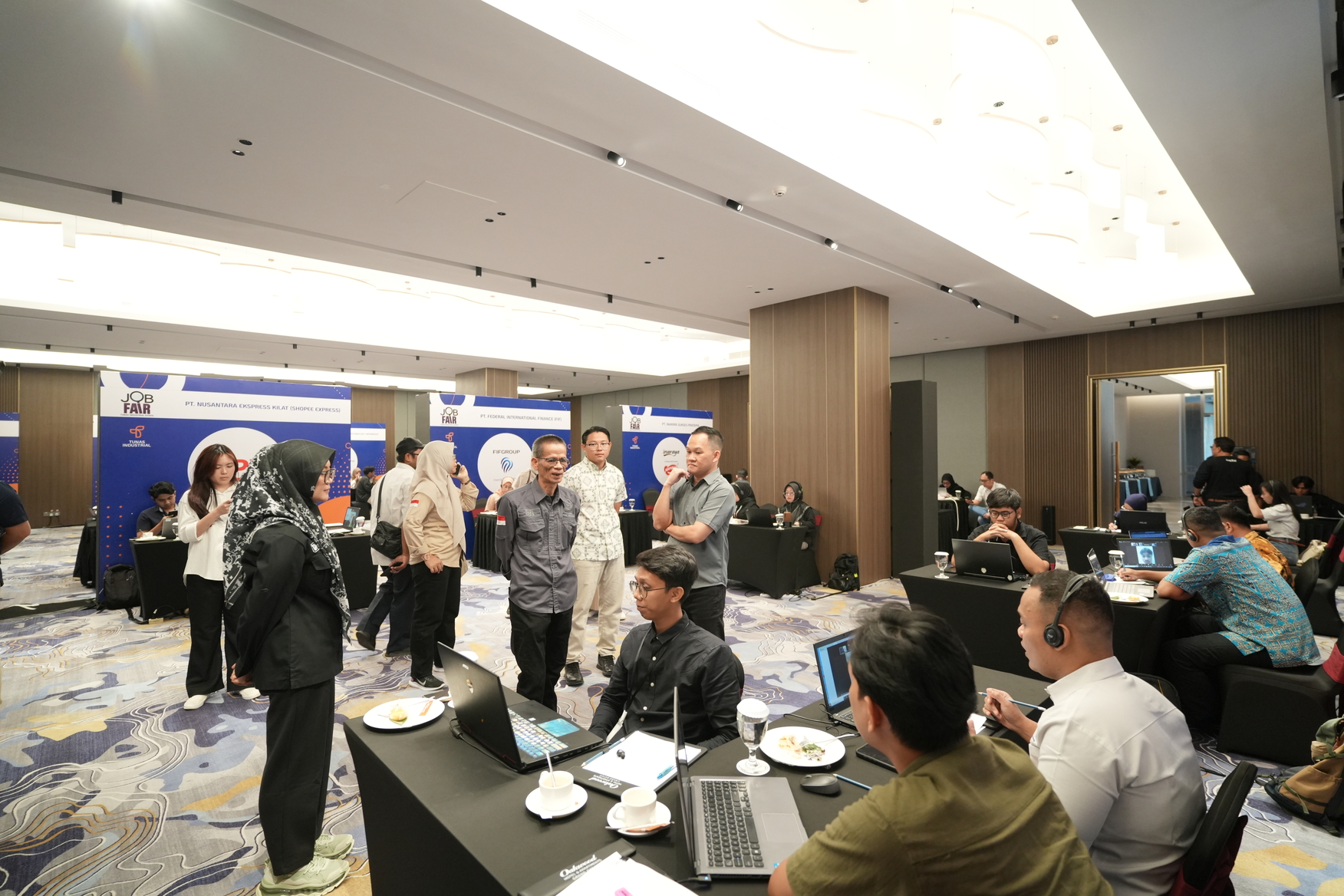
“We see great potential in Batam’s workforce, especially among the younger generation. This job fair aims to connect companies with local talent who are ready to work and grow with the industry,” he said. He also noted that this initiative serves as a value-added service for investors who have placed their trust in Tunas Industrial Estate.
In addition to general applicants, the job fair also opened access for persons with disabilities. 147 applicants with disabilities applied for positions at Alfamart, and after verification, 40 candidates were shortlisted for in-person interviews with special accommodations.
The Tunas Industrial Job Fair 2025 not only served as a platform to connect job seekers and employers but also marked a collaborative effort between the industrial sector and local government to foster a modern, efficient, and adaptive labor system. Final results of the selection process will be announced within 30 days following the event.

26 May
Skilled Indonesian Labor for International Expansion
Batam, May 26, 2025 – In the global race for business growth and expansion, Indonesia is emerging as a key player—not just because of its market size, but also because of the strength and promise of its workforce. With a strategic location in Southeast Asia, a booming population, and a growing pool of skilled professionals, Indonesia offers companies an unbeatable combination of market potential and talent.
A Massive Market Ready to Grow with You
Indonesia is the world’s fourth most populous country, with over 277 million people—and that number continues to grow (United Nations ESCAP, 2025). For any business eyeing expansion, that means one thing: opportunity. A population of this size provides a vast and diverse consumer base ready to engage with new products, technologies, and services.
Even more compelling is Indonesia’s expanding middle class. As incomes rise and urbanization accelerates, consumer behavior is shifting rapidly—toward more premium goods, digital services, and modern lifestyles. Businesses entering this market can tap into a segment with increasing purchasing power and evolving preferences (PwC Indonesia, 2023).
Skilled and Competitive Workforce
One of Indonesia’s greatest strengths lies in its people. The country boasts a young and dynamic population, with more than 60% under the age of 40 (World Bank, 2024). This youthful demographic is not only tech-savvy but also adaptable—traits essential in today’s fast-changing global economy.
In recent years, Indonesia has seen a steady rise in skilled professionals across various sectors. From engineers and IT experts to entrepreneurs and digital marketers, the local workforce is becoming increasingly capable of meeting modern business demands. Government and private initiatives in education and vocational training have further boosted the pool of skilled labor available to companies (Ministry of Education, Culture, Research, and Technology, 2023).
Moreover, labor costs in Indonesia remain competitive compared to many Western countries and even some of its Asian neighbors (ASEAN Briefing, 2024). Businesses can tap into high-quality talent without incurring excessive overhead—an ideal scenario for long-term scalability.
Batam: A Local Example of National Progress
One shining example of this skilled labor momentum is Batam. As a designated Free Trade Zone and Special Economic Zone (SEZ), Batam has developed into one of Indonesia’s most business-friendly regions. It is home to over 1.4 million people (Badan Pusat Statistik [BPS] Kota Batam, 2024), with a productive-age workforce exceeding 750,000—a figure that continues to grow in step with the city’s economic ambitions.
Even more promising is Batam’s declining unemployment rate, which fell to 6.49% in 2023, down from 8.82% in 2021 (BPS Kota Batam, 2024). This trend reflects not only increasing job opportunities but also a workforce that is increasingly absorbed by industry, manufacturing, digital services, and logistics.
Batam is also rich in educational infrastructure. The city hosts a growing number of higher education institutions offering diverse and industry-aligned majors, including engineering, business, maritime logistics, information technology, and creative design (Lembaga Layanan Pendidikan Tinggi Wilayah X, 2023). This creates a steady pipeline of job-ready graduates who meet the evolving needs of employers across sectors.
The Strategic Advantage for Investors
Whether you’re a manufacturing giant looking for cost-efficient production or a tech startup seeking agile digital talent, Indonesia’s labor force offers a solid foundation for sustainable growth. Companies that invest now are not only securing access to a skilled and youthful workforce, but they’re also positioning themselves at the heart of one of the fastest-growing economies in the world.
Indonesia isn’t just a place to outsource tasks—it’s a place to build, scale, and innovate.
The future of your business expansion starts with people—and Indonesia’s people are ready.
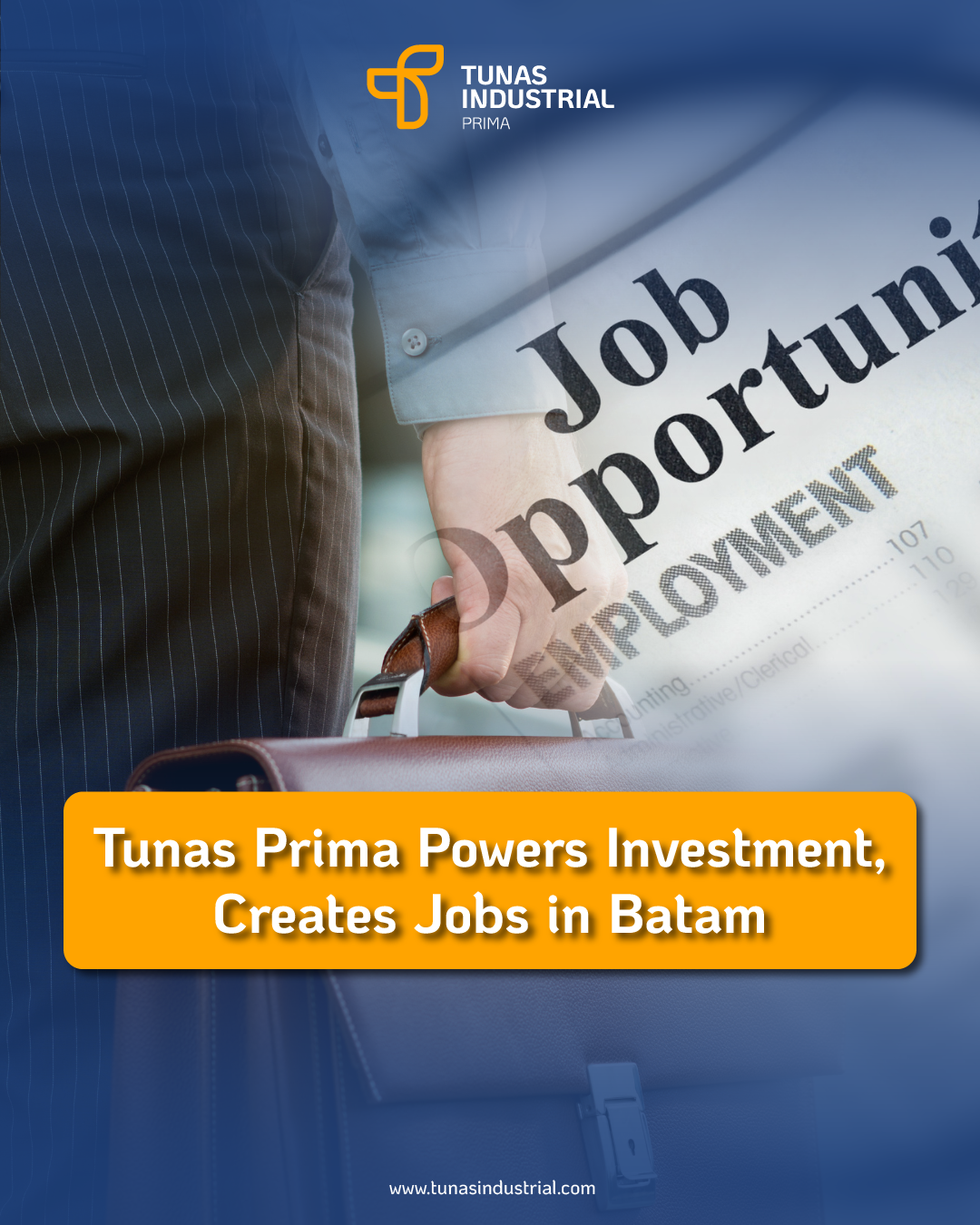
23 Apr
Tunas Prima Sparks Growth and Opportunity in Batam
Batam, April 23, 2025 – As global industries seek stable, strategic, and growth-ready locations, Batam is stepping into the spotlight. Foreign investments are pouring into the region, with Tunas Prima Industrial Estate emerging as a catalyst for change—creating jobs and powering the local economy.
A Surge of Foreign Investment
Despite widespread economic challenges and slowdowns in many parts of the world, Batam has proven itself to be resilient and attractive to international investors. Four major foreign companies have already confirmed their plans to begin operations within Tunas Prima Industrial Estate by 2025. With construction and operational preparations underway, these developments signify a major boost in confidence toward Batam’s investment climate.
These investments do more than just bring capital—they send a strong signal that Batam is evolving into a key industrial destination in Indonesia’s economic landscape. The presence of foreign investors reinforces the island’s identity as a manufacturing hub while positioning it for even greater roles in global value chains.
Job Creation at Scale
Perhaps the most visible and impactful outcome of this influx is the creation of thousands of job opportunities. By 2025, Tunas Prima Industrial Estate is projected to provide employment for around 2,500 local workers, with that number expected to double to 5,000 by 2026. In a city where over 17,000 job seekers—from recent high school graduates to university alumni—are actively searching for employment, this surge in opportunity couldn’t come at a better time. Local authorities, Batam’s Department of Manpower (Dinas Tenaga Kerja), have expressed strong support and are working to ensure the recruitment process benefits local communities first.
Strengthening the Industrial Core
Tunas Prima is not just bringing jobs—it’s also attracting foreign investment in a strategically vital sector: electronics manufacturing. This aligns with global industry trends and supports Indonesia’s ambition to move up the value chain. The companies joining Tunas Prima bring with them not only financial resources, but also technological expertise, modern production systems, and international best practices.
This dynamic synergy strengthens Batam’s industrial base, making it more competitive and future-ready—especially in embracing Industry 4.0 and beyond. Local workers stand to benefit from knowledge transfer, improved skills, and better long-term career prospects.
At the heart of this economic movement is Tunas Prima Industrial Estate. Since its development began in 2023, the Estate has positioned itself as a high-potential, future-ready investment destination. By attracting leading manufacturers and ensuring robust infrastructure, it offers not just space—but opportunity.
Its presence is now vital to Batam’s growth trajectory, acting as a magnet for investors and a launchpad for a stronger, more inclusive economy. As investment flows in and factories gear up for production, the impact on Batam will be felt far and wide. Thousands of job opportunities, enhanced industrial capabilities, and a rejuvenated economy are only the beginning.

21 Apr
One Stop Business Solution for Industrial Expansion in Batam
Indonesia is rapidly becoming Southeast Asia’s industrial powerhouse, and Batam stands at the forefront of this transformation. Strategically located within the Indonesia–Singapore–Malaysia Growth Triangle, Batam offers excellent infrastructure, competitive labor costs, and a thriving manufacturing ecosystem. But tapping into its full potential requires more than ambition—it demands local expertise, integrated solutions, and a partner who understands the landscape inside out.
That’s where Tunas Prima steps in.
Your Strategic Partner for Seamless Market Entry
Expanding your operations to Batam can be a game-changer—if done right. With Tunas Prima, you’re backed by a team of seasoned professionals offering end-to-end business support. From regulatory setup to infrastructure development, we ensure every step of your investment is efficient, compliant, and future-ready.
Comprehensive Business Solutions Tailored to Investors
We go beyond consulting—we offer hands-on execution and strategic insights to turn your plans into results.
- Market Entry Strategy: Understand Batam’s industrial terrain with localized, data-driven strategies.
- Supply Chain Optimization: Streamline costs and increase efficiency through smart logistics planning.
- Manufacturing Facility Selection: Choose the best industrial location aligned with your growth objectives.
- Operational Coaching: Empower your local teams with global-standard operational best practices.
Corporate Governance & Compliance You Can Trust
Doing business in a new country comes with legal complexity. We help you build a solid foundation to grow securely and sustainably.
- Company Formation & Structuring: Establish your entity with a robust legal framework and clarity.
- Regulatory Compliance & Governance: Stay aligned with dynamic Indonesian business laws and minimize risk.
- Accounting, Tax & Audit: Ensure financial transparency, efficiency, and audit readiness.
- HR & Payroll Services: Manage your workforce with precision and compliance.
Industrial Infrastructure & Facility Development
Whether you’re building a manufacturing plant or logistics hub, Tunas Prima transforms your ideas into world-class facilities.
- Master Planning & Design: Maximize productivity with intelligent, scalable layouts.
- Engineering & Structural Planning: Ensure facility resilience and long-term performance.
- Construction & Project Management: Deliver your project on time, within scope, and on budget.
Logistics, Shipping & Trade Facilitation
As Batam continues to rise as a trade hub, efficient logistics becomes your edge. We make cross-border trade smooth, reliable, and fast.
- Freight & Cargo Handling – Secure and cost-efficient transport solutions.
- Customs Brokerage & Compliance – Hassle-free import/export processing.
- Warehousing & Distribution – Optimize inventory storage and management.
- Port & Shipping Services – Reliable support for maritime operations.
Why Choose Tunas Prima?
Tunas Prima isn’t just a service provider—we are your strategic partner in long-term growth. With decades of local insight, extensive networks, and a commitment to execution, we help you scale with confidence.
- One-Stop Business Solution – From setup to execution, we handle it all.
- Industry Expertise – Deep knowledge of Batam’s business and regulatory landscape.
- Tailored Strategies – Customized solutions to fit your specific business needs.
Ready to take the next step? Let’s discuss how Tunas Prima can support your expansion in Batam!
📩 Contact us today to explore your opportunities.
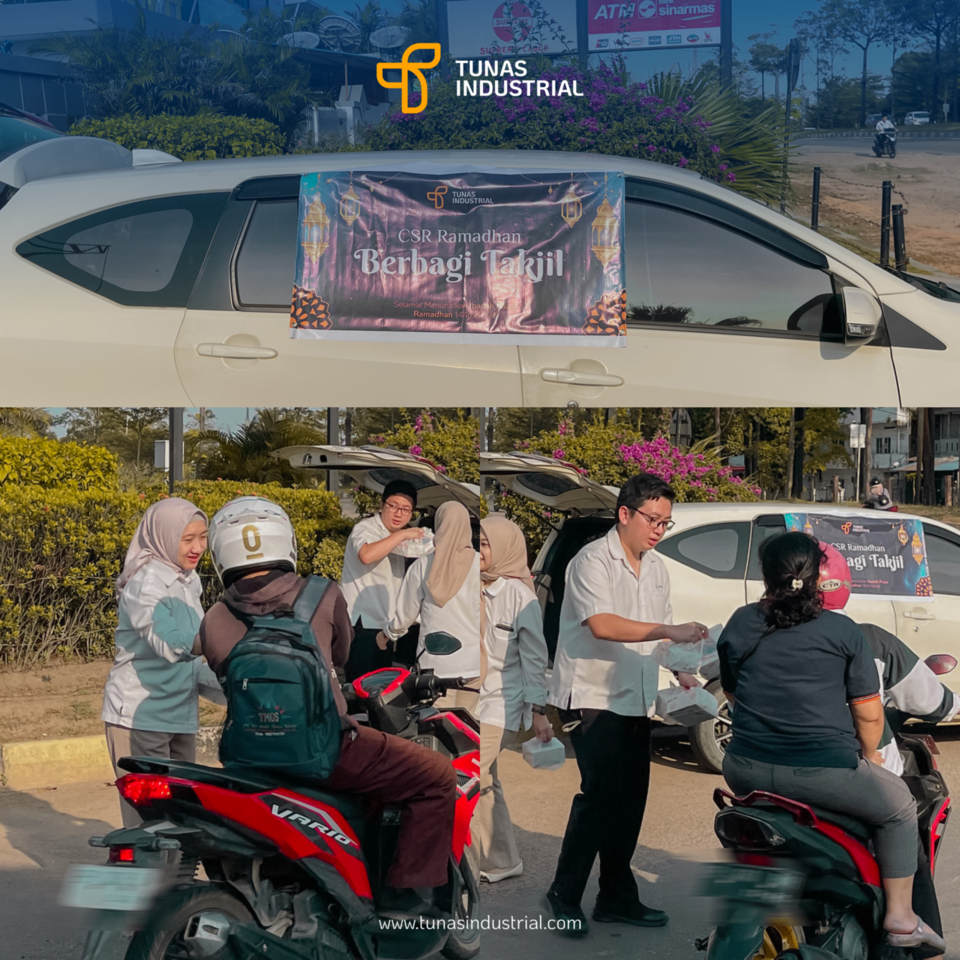
08 Mar
Spreading Joy of Ramadhan with Takjil Sharing by Tunas Industrial
Batam, March 8, 2025 – What better way to spread joy and unity during Ramadan than by sharing a simple yet meaningful gesture like takjil? On March 4th, 2025, in celebration of the holy month, the Tunas HR Department made a heartfelt effort to show love and kindness by distributing takjil to passersby near the front gate of Tunas Industrial Batam Center.
This initiative is part of the company’s commitment to corporate social responsibility (CSR), aimed at giving back to the community during the holy month of Ramadan. The act of distributing takjil – traditional light meals served to break the fast – is not only a symbol of generosity but also a reminder of the importance of kindness, compassion, and solidarity.
A Tradition of Giving Back
Ramadan is a time of reflection, self-discipline, and charity. For many, it is also a month of connecting with others and giving as one of the fundamental principles of Ramadan. Recognizing this, Tunas HR Department took the opportunity to engage in a CSR activity that directly benefits the local community. By providing takjil to those in need, we hope to foster a sense of community and strengthen the bonds of solidarity across different backgrounds.
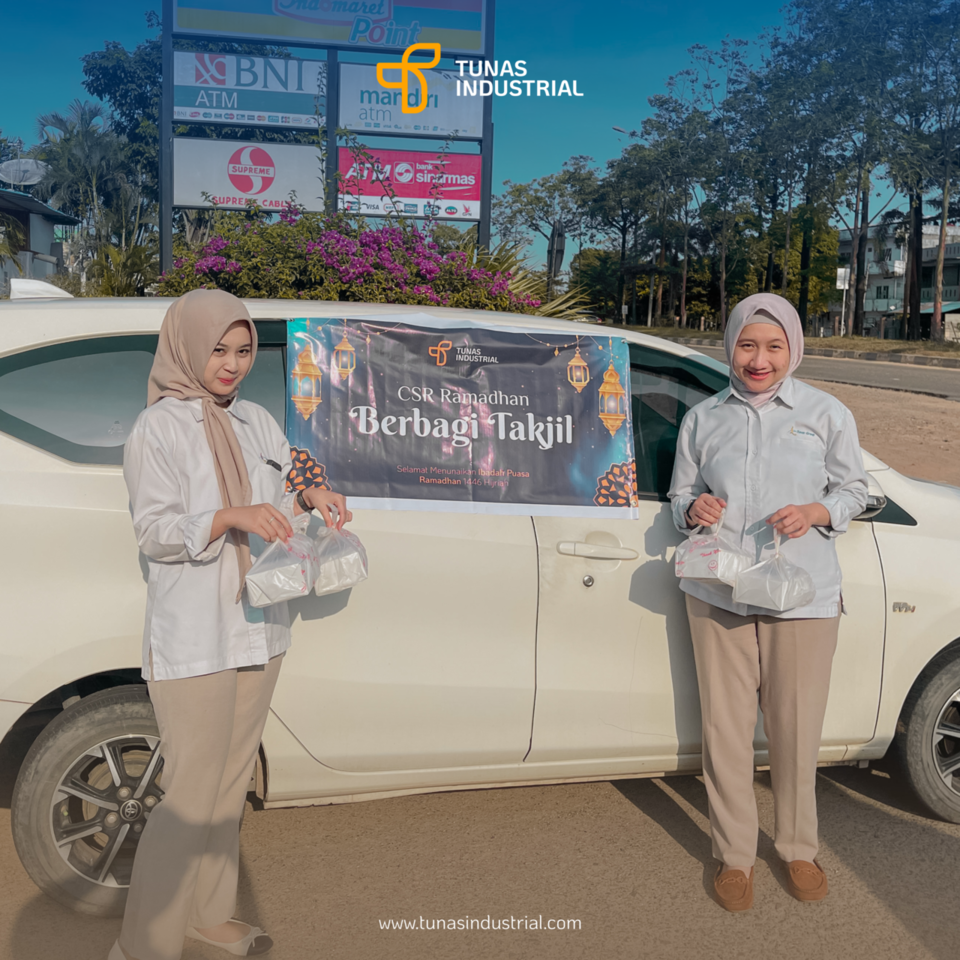
“We wanted to contribute in a meaningful way and bring joy to the people around us,” said Edi Effendi, the head of the HR Department. “In the spirit of Ramadan, a small act like sharing takjil can create a big impact. It’s our way of showing appreciation for the support we’ve received from the community throughout the year.”
Strengthening Bonds of Solidarity
The act of sharing takjil not only nourishes the body but also nurtures relationships between Tunas and the community. As employees and residents gathered around the front gate of Tunas Industrial Batam Center, the simple act of giving became a powerful tool for building unity.
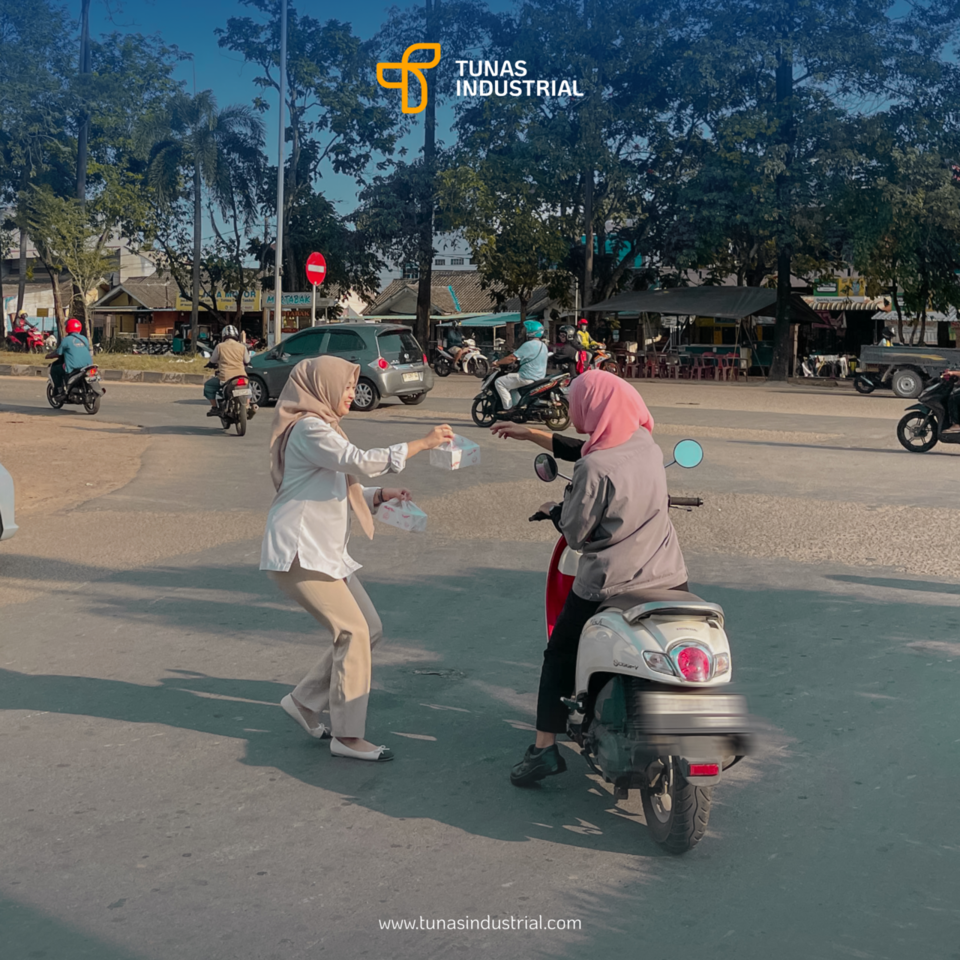
The company’s initiative was met with heartfelt appreciation. After a long day of fasting and work, the takjil distribution brought smiles to many faces. It wasn’t just about fasting during Ramadan; it was a reminder of the joy that comes from sharing and spreading kindness to others, making the day a little brighter for everyone.
Looking Forward
The success of this CSR activity has inspired us to continue finding ways to contribute to the community, not just during Ramadan, but throughout the year. With plans for future initiatives aimed at addressing local needs, our company remains committed to strengthening its relationship with the Batam community and beyond.
Through acts of kindness like the sharing of takjil, Tunas Industrial hopes to set an example of how businesses can play an active role in enriching the lives of those around them. The gesture may be small, but its impact is certainly felt far and wide. Let us all continue this spirit of giving and kindness, and spread joy to those around us, especially during this blessed month of Ramadan.

06 Mar
Understanding Ramadan: Its Significance and Impact on Indonesian Society
Batam, March 6, 2025 – Ramadan, the holiest month in Islam, holds profound significance for Indonesia, the country with the world’s largest Muslim population. This sacred month, while primarily a time for religious reflection, also deeply influences the social, cultural, and economic dynamics of the nation. In Indonesia, Ramadan is not only a time of fasting but also a period that strengthens bonds, fosters charity, and impacts various aspects of daily life. This article explores what Ramadan means for Indonesia, its importance, and the impact it has on Indonesian society.
Family and Community Bonds
A unique and cherished aspect of Ramadan in Indonesia is its remarkable ability to foster a sense of togetherness and strengthen bonds within families and communities. The communal nature of fasting allows families to unite and share in the experience, making the month even more special. In the evenings, families or friends gather to break their fast with a meal known as iftar or bukber (breaking fast together). This shared experience deepens the sense of unity and connection. Many also take this time to visit extended family members or friends, exchanging good wishes and enjoying meals together.
Community life thrives during Ramadan. Evening taraweeh prayers at mosques often attract large crowds, creating a sense of unity and collective worship. In towns and villages, traditional Ramadan activities such as takbiran (the chanting of the Takbir to mark the start of Eid) and sahur (pre-dawn meal) are conducted as part of the festive rituals, reinforcing the importance of solidarity in both worship and daily life.
Ramadan and Economic Impact
While Ramadan is a deeply spiritual occasion, it also has significant economic implications for Indonesia. The holy month brings changes in consumer behavior, especially in the retail and food sectors.
In the weeks leading up to Ramadan, many businesses see a surge in demand for goods such as clothing, food, and gifts, as Indonesians prepare for the fasting month and the celebration of Eid al-Fitr (Hari Raya), the festival marking the end of Ramadan. Markets are filled with special Ramadan promotions, food stalls, and street vendors selling traditional treats that are enjoyed during the month, such as kolak (sweet dessert made from bananas, coconut milk, and palm sugar), kurma (dates), and various savory snacks.
One of the most iconic traditions associated with Ramadan in Indonesia is Mudik, the annual homecoming journey that millions of city dwellers undertake to reunite with their families in rural areas for Eid al-Fitr. This mass migration, which peaks during the two weeks leading up to Eid, not only strengthens familial bonds but also plays a crucial role in stimulating the transportation, retail, and hospitality sectors. It’s one of the largest human migrations globally, creating both economic opportunities and a sense of national unity.
Cultural Traditions During Ramadan
Food holds a special cultural significance during Ramadan. From the pre-dawn meal sahur to the evening iftar, Indonesian households and street vendors offer an array of traditional foods, bringing people together over shared meals. Street markets bustle with vendors selling takjil—light snacks to break the fast—and delicacies such as kolak and nasi uduk, reflecting the diverse culinary heritage of the archipelago.

Ramadan in Indonesia is also a time to celebrate the country’s rich cultural diversity. Non-Muslim communities often show great respect for their Muslim neighbors’ fasting practices, and it’s not uncommon for different faiths to participate in the spirit of the season by contributing to charitable causes or joining in festive events. This mutual respect fosters a sense of national solidarity and highlights the country’s commitment to religious tolerance.
The End of Ramadan: Eid al-Fitr and THR
Eid al-Fitr (Hari Raya), the celebration marking the end of Ramadan, is one of the most important holidays in Indonesia. It is a national holiday and is widely celebrated by people from all walks of life. It’s a time for forgiveness, family reunions, and expressing gratitude for the strength and patience shown during the month of fasting.

A key component of the Eid celebrations is Tunjangan Hari Raya (THR), the annual holiday bonus that employers provide to their employees. According to the Undang-Undang Cipta Kerja (Omnibus Law), specifically Article 81, Number 28, Perppu Cipta Kerja which amends Pasal 88E UU Ketenagakerjaan, Tunjangan Hari Raya (THR) is one of the employee rights guaranteed by the employment regulations in Indonesia. This tradition not only brings financial relief but also allows Indonesians to enjoy a more comfortable celebration with family and friends. Many workers eagerly anticipate their THR, which plays a crucial role in making the Eid festivities more joyful for those of modest means.
| Duration of Service | THR Amount |
| 1 Month | Pro-rata, based on months worked |
| 12 Month | 1 month salary |
Ramadan in Indonesia is more than a time of fasting—it is a profound cultural and societal experience that touches every aspect of life. From spiritual reflection to familial bonds, from economic impacts to cultural traditions, Ramadan serves as a reminder of the values that unite Indonesians in faith and in life. It is a time of personal growth, compassion, and shared joy, making it a defining feature of Indonesian identity. Ramadan is not only a month of fasting but also a celebration of life, faith, and togetherness.
- 1
- 2
